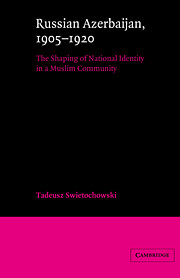Book contents
- Frontmatter
- Contents
- Preface
- Maps
- 1 A century of Russian rule
- 2 The 1905 Revolution and Azerbaijani political awakening
- 3 The era of war and revolutions: ideologies, programs, and political orientations
- 4 Transition to nationhood: in quest of autonomy
- 5 Transition to nationhood: Transcaucasian federalism
- 6 The Azerbaijani nation-state
- 7 The coming of Soviet power
- Conclusion
- Abbreviations
- Notes
- Bibliography
- Index
- Frontmatter
- Contents
- Preface
- Maps
- 1 A century of Russian rule
- 2 The 1905 Revolution and Azerbaijani political awakening
- 3 The era of war and revolutions: ideologies, programs, and political orientations
- 4 Transition to nationhood: in quest of autonomy
- 5 Transition to nationhood: Transcaucasian federalism
- 6 The Azerbaijani nation-state
- 7 The coming of Soviet power
- Conclusion
- Abbreviations
- Notes
- Bibliography
- Index
Summary
This book deals with Russia's borderland region inhabited by the Azerbaijanis, Turkic-speaking Muslims, a large portion of whom live across the frontier in Iran. The discussion centers on the emergence of ideas and the subsequent efforts aimed at the creation of a new collective identity among the local Muslims – a sense of nationality. Chronologically, this work focuses on the period from the Russian Revolution of 1905, when the Azerbaijanis began to articulate their national aspirations, until the establishment of the Soviet Azerbaijani Republic in 1920. By way of historical background, the discussion extends to major issues of Russian rule in the preceding century.
As opposed to the case of their Armenian and Georgian neighbors, the modern history of the Azerbaijanis, the largest national group in Transcaucasia, has not been a subject of a monograph in any Western language, although some works on the region's history by American scholars discuss in part pre-1920 Azerbaijan. Also, the books on Russia's Muslim community deal in part with the Azerbaijanis, who in some respects led it in the advancement toward modernity.
By contrast, the Soviet historical writing on Azerbaijan is massive. In its various periods, Soviet historiography has exhibited deep differences in the scope and treatment of particular issues, yet generally it has tended to overemphasize some and downgrade other aspects of the Azerbaijanis' past.
- Type
- Chapter
- Information
- Russian Azerbaijan, 1905–1920The Shaping of a National Identity in a Muslim Community, pp. vii - xPublisher: Cambridge University PressPrint publication year: 1985

